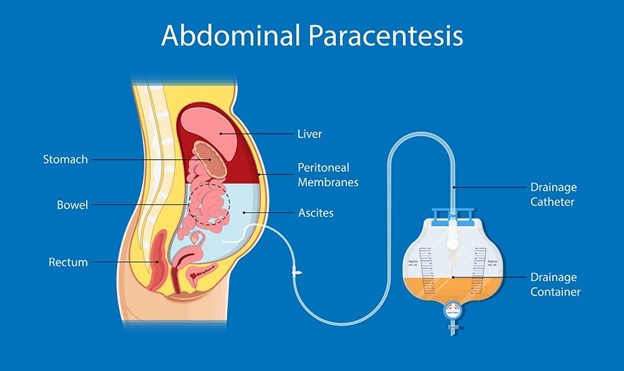A nurse is collecting data from a client following a lumbar puncture. The nurse should identify which of the following findings as a potential adverse effect of this procedure?
Fluid overload.
Diarrhea.
Headache.
Difficulty voiding.
The Correct Answer is C
The correct answer is choice C. Headache.
Choice A rationale:
Fluid overload is not a potential adverse effect of a lumbar puncture. A lumbar puncture involves the removal of cerebrospinal fluid (CSF) from the spinal canal, which wouldn't lead to fluid overload. This choice is not relevant to the procedure.
Choice B rationale:
Diarrhea is not a common adverse effect of a lumbar puncture. The procedure involves accessing the spinal canal and collecting CSF, which is not directly connected to the gastrointestinal system. Diarrhea is unrelated to the procedure.
Choice C rationale:
Headache is a potential adverse effect of a lumbar puncture. This is caused by the leakage of cerebrospinal fluid (CSF) through the puncture site, leading to a decrease in CSF pressure. This drop in pressure can cause a headache, particularly when the client sits or stands up. The headache is often described as severe and may be accompanied by neck pain and sensitivity to light. It usually resolves within a few days but can be managed with pain relief medications and plenty of fluids.
Choice D rationale:
Difficulty voiding is not a common adverse effect of a lumbar puncture. The procedure involves the lower back and spinal canal, and it doesn't directly affect the urinary system. This choice is unrelated to the procedure and its potential complications.
Nursing Test Bank
Naxlex Comprehensive Predictor Exams
Related Questions
Correct Answer is B
Explanation
The correct answer is choice B. Removing the client's dentures.
Choice A rationale:
Gathering the client's personal belongings is an appropriate action in the postmortem care process. This step allows the family to receive their loved one's belongings, contributing to a compassionate and respectful care process.
Choice B rationale:
Removing the client's dentures requires intervention by the nurse. In postmortem care, dentures should be left in place to maintain the natural appearance of the deceased's face and to ensure that the mouth and lips maintain their proper form.
Choice C rationale:
Placing absorbent pads under the client's buttocks is a common practice to manage any potential leakage of bodily fluids after death. This action helps maintain the cleanliness and dignity of the deceased individual.
Choice D rationale:
Closing the client's eyes is an appropriate action during postmortem care. It provides a peaceful appearance and shows respect for the deceased person.
Correct Answer is B
Explanation
The correct answer is choice B: Performance of a paracentesis.
Choice A rationale:
Administration of an enema does not require informed consent in the same way that invasive procedures do. Enemas are typically considered routine nursing interventions and are not as invasive as the other options.
Choice B rationale:
This is the correct choice. A paracentesis is an invasive procedure that involves puncturing the abdominal cavity to withdraw fluid. Informed consent is required for procedures that carry potential risks, and paracentesis falls into this category due to the risk of complications such as infection, bleeding, or organ injury.

Choice C rationale:
Insertion of an indwelling urinary catheter is a common nursing procedure that, while invasive, does not typically require informed consent. However, the nurse should still explain the procedure to the client and obtain verbal consent, but it's not the same level of formal informed consent required for more invasive procedures.
Choice D rationale:
Placement of an NG tube, although uncomfortable, is not as invasive as a paracentesis. In most cases, NG tube placement is considered a medical or nursing intervention rather than a procedure that necessitates formal informed consent.
Whether you are a student looking to ace your exams or a practicing nurse seeking to enhance your expertise , our nursing education contents will empower you with the confidence and competence to make a difference in the lives of patients and become a respected leader in the healthcare field.
Visit Naxlex, invest in your future and unlock endless possibilities with our unparalleled nursing education contents today
Report Wrong Answer on the Current Question
Do you disagree with the answer? If yes, what is your expected answer? Explain.
Kindly be descriptive with the issue you are facing.
